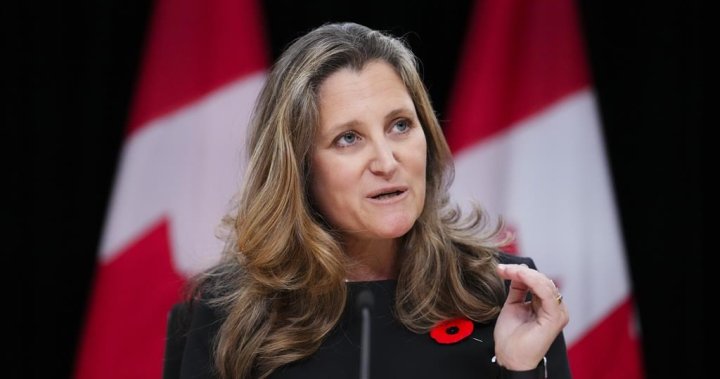Deputy Prime Minister Chrystia Freeland expressed her concerns about Mexico’s trade policies with China, stating that she shares the “legitimate” concerns about the issue. She emphasized the importance of alignment between North American countries on Chinese vehicle tariffs. Freeland did not explicitly agree with Ontario Premier Doug Ford’s suggestion to exclude Mexico from free trade talks, but she acknowledged that she has some sympathy for his concerns, which have also been raised by incoming U.S. president Donald Trump. There are concerns that Mexico is not following the same economic relationship practices with China as Canada and the U.S., which could affect trade agreements.
Canada and the U.S. have implemented tariffs on Chinese imported electric vehicles and steel and aluminum, but Mexico has not followed suit. Ford proposed negotiating a bilateral trade deal between Canada and the U.S. without Mexico if the country does not impose similar tariffs on Chinese imports. Freeland’s comments went farther than Prime Minister Justin Trudeau’s, who mentioned efforts to bring Mexico in line with the U.S. and Canada in terms of protecting jobs and addressing environmental and labor concerns. Canada’s actions on Chinese imports currently align it fully with the U.S. in terms of economic policy toward China.
Trump has expressed his intention to renegotiate the Canada-United States-Mexico Agreement (CUSMA) during the scheduled review in 2026 to address concerns with Mexico. Chinese automakers are eager to build manufacturing plants in Mexico to take advantage of the lower production costs compared to the U.S. and Canada. The fear is that Chinese companies could use Mexican manufacturing plants to exploit CUSMA’s duty-free import rules and flood the North American market with Chinese cars while avoiding tariffs from the U.S. and Canada. Trump has threatened tariffs on all Mexican imports if the country does not address migrant flows at the U.S. border.
During his presidential campaign, Trump proposed imposing tariffs on vehicles imported from Mexico, which could have negative effects on American automakers in the short term. He also suggested high levies on Chinese companies operating in Mexico and bypassing CUSMA rules. If Trump follows through with these threats, Mexico has vowed to retaliate with tariffs on American imports, potentially leading to economic harm in North America. The situation highlights the complex trade relations between North American countries and the challenges posed by China’s involvement in the region.
Overall, the concerns about Mexico’s trade policies with China are a point of contention between Canada, the U.S., and Mexico. The issue underscores the need for alignment among North American countries on trade practices to protect jobs, address environmental and labor concerns, and ensure fair trade agreements. As Trump prepares to renegotiate CUSMA and potentially impose tariffs on Mexican imports, the situation remains fluid and could have significant implications for the economic relationship between the countries involved. The ongoing discussions and debates surrounding this issue reflect the complex nature of international trade and the challenges of balancing economic interests with political considerations.













